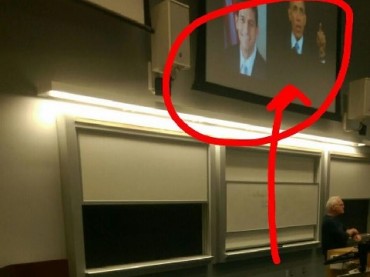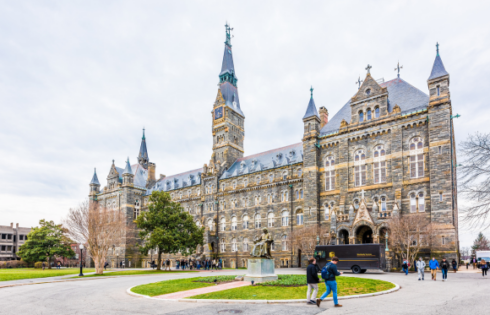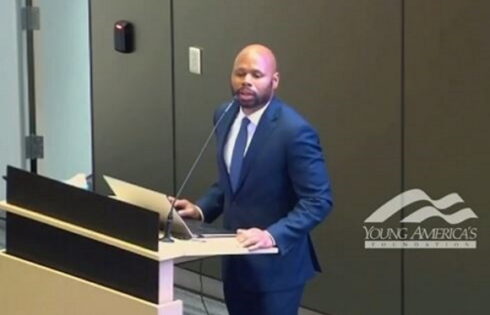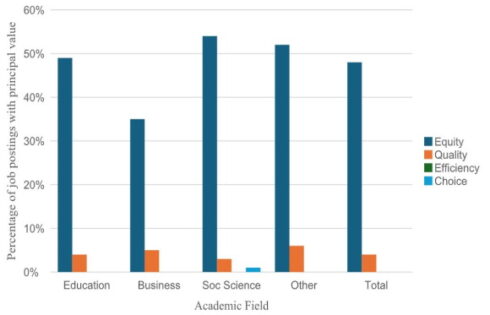
A science professor at UCLA recently raved to his students about President Barack Obama’s State of the Union speech, telling them it was “really, really good” and that “I was so excited, I was jumping up and down in my seat.”
Professor Jake Lusis then suggested the American health care system isn’t that great “for a lot of people,” and proceeded to plug Obama’s proposal to expand federal funding for medical research, suggesting it could save lives, according to an audio clip of the lecture obtained by The College Fix.
The scholar made the comments the day after the State of the Union address while standing in front of a split-screen image of President Obama and U.S. Congressman Paul Ryan – chairman of the House Ways and Means Committee and the most visible leader among Republicans on budgetary issues.
“As a conservative student in the class I felt he was making an offensive (and unnecessary) implication that hit a sour note with me,” a student told The College Fix.
When Professor Lusis was asked by The College Fix what he would say to someone who would suggest his comments, along with the slide, implied that Obama’s budget could save lives while Republicans might try to stymie such a noble cause with their budget priorities, he said in an email that “I was not trying to advocate for any particular position but simply trying to get students interested in the political process and making them aware of the implications for medicine in the US.”
“At this point I don’t know enough about the President’s initiative to form a solid opinion but I would hope that science students will take the time to look into it,” Lusis added.
During Obama’s Jan. 20 address, the president stated that “I want the country that eliminated polio and mapped the human genome to lead a new era of medicine – one that delivers the right treatment at the right time. In some patients with cystic fibrosis, this approach has reversed a disease once thought unstoppable. Tonight, I’m launching a new Precision Medicine Initiative to bring us closer to curing diseases like cancer and diabetes – and to give all of us access to the personalized information we need to keep ourselves and our families healthier.”
In response, Lusis told his class on Jan. 21 that:
“I hope you guys all saw the president’s state of the union address. I thought it was really, really good. I was so excited, I was jumping up and down in my seat. Maybe not all of you agree, but you know the big thing now is there was a conflict in Congress: “How much should we
support uh, uh, uh, how much should we support research, right?” And the president addressed this as well. And so uh, one interesting fact is that we spend about three trillion dollars on health care in the United States. And we don’t even have such great health care, right, for a lot of people. And only one tenth of a percent of that is spent on research. So the question is this: If we spent say two-tenths of a percent could we have a big improvement? Could we really help a lot of people? Probably, yes, right? I mean if you think what research has done for common diseases in the past, at the turn of the century what were the common diseases that killed people? They are all infectious diseases, right, all infectious diseases, tuberculosis, and now what it is is heart disease and cancer and diabetes. But they can have a huge impact. You know, think about the AIDS epidemic, actually it was discovered right here at UCLA, hit thirty years ago. If we didn’t know how to understand viruses like the HIV virus, if we didn’t have the tools to develop therapies, where would we be? I mean, it would be a disaster, right? So this is something to think about, it’s just sort of a plug, I do research. But I think it’s real, real important. It’s a pretty astounding figure, I think.”
On Friday, details on Obama’s Precision Medicine Initiative were released by the White House. It proposes a $215 million investment to the National Institutes of Health, the Food and Drug Administration, and the Office of the National Coordinator for Health Information Technology.
Most of that – $130 million – would go to the NIH for “development of a voluntary national research cohort of a million or more volunteers to propel our understanding of health and disease and set the foundation for a new way of doing research through engaged participants and open, responsible data sharing,” according to the White House.
The New York Times described the database as “a research consortium that would collect information from large numbers of people. The data could include medical records, laboratory test results, profiles of patients’ genes, and information about their diet, tobacco use, lifestyle and environment.”
Professor Lusis is a researcher with the UCLA-based Lusis Laboratory, which is involved in “system genetics resources.”
Jennifer Kabbany is editor of The College Fix (@JenniferKabbany)
Like The College Fix on Facebook / Follow us on Twitter






Please join the conversation about our stories on Facebook, Twitter, Instagram, Reddit, MeWe, Rumble, Gab, Minds and Gettr.